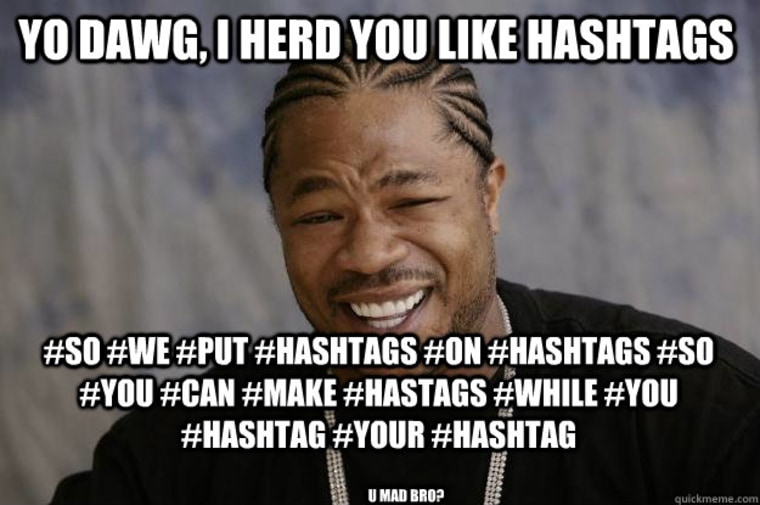
We’re officially in the era of too many hashtags. Nearly three-quarters of social media users stick them in posts, according to a March 2013 study from RadiumOne. But quickly scan Twitter, Instagram, Google+, Tumblr — and now Facebook — and even that seems low. In January, France banned the word hashtag. Should America follow suit and ban the hashtag itself?
Even the father of the hashtag tells NBC News that enough is enough. “The worst thing is what I might call ‘poor hashtag grammar,’” says Chris Messina, a Google engineer who first suggested hashtags as a Twitter tool back in 2007. “Like #when #people #tag #every #word #in #a #sentence! That's not the point!”
Another form of hashtag abuse is the single coherent phrase followed by a string of eyeball-assaulting nonsense. Your desperation is not a good look. We get it, you want more followers and you want to appear hip. If you used hashtags in 2007, you looked cool; if you do it in 2013, you just look desperate.
For an example, we'll pick on this guy, evidently a Miami Heat fan:
And when you use hashtags to join in the conversation, does anybody really hear you? When "Game of Thrones" fans, upset over the "Red Wedding," took to Twitter using the #GoT hashtag, they averaged 6,000 tweets per minute, according to Trendrr.tv. Good luck “keeping up with that conversation.”
Celebrities set the worst examples — too often they're hashtagging about advertisers, new promotions of their own and more. It’s great that Kim Kardashian loved her EOS lip balm while pregnant ...
... but she was likely paid $20,000 for that message. If you retweet it, you're not getting a dime. Hashtags are big business, as Twitter proves by charging advertisers $200,000 per day for Promoted Trends.
These days, it’s unusual for a TV program, event or brand (let alone Instagram users) to not have a hashtag. But what does it matter if you can’t make sense of the hashtags through all the noise? On the other hand, if a conversation or event is happening sans hashtag, some may ask, ”Does that conversation even matter?” It's time to be a little more self-conscious about the pound sign.
“The best thing about hashtags is their flexibility — and how much fun, creativity and utility people get,” says Messina.
In recent months, it’s been nice to see hashtags become rallying cries in cities following tragedy and devastation, notably #BostonStrong, #OKStrong and campaigns like Ann Curry’s #26Acts. In other cases, they’re great collections of humor, such as the "Late Night with Jimmy Fallon" hashtag segments. (NBC News is a division of NBC Universal, employers of Jimmy Fallon and Ann Curry — but regardless of the affiliation, we'd still think their hashtag work was nicely done.)
“Hashtags are an interesting cultural meme,” says Jonah Berger, author of ‘Contagious: Why Things Catch On’ and a marketing professor at the University of Pennsylvania. “They started as a way for people to find a particular topic or conversation. They started out useful and utilitaritarian, but have evolved to this notion of being a cultural phenomenon and acting as if you are in the know. So that’s what we do: we hashtag everything now.”
But that’s the problem — everything does not need to be hashtagged. For certain things in life, hashtags make sense. TV shows, including big live events and advertising campaigns, fit in that category. The rest of what you’re doing and talking about… forget it. #Lunch? No. #Friday? No. #GreenBeans? No, no, no.
“The best hashtags are used sparingly, when they really add value or zing,” Messina says. “A simple test is to remove the words you've hashtagged from your post and consider how it reads. You should still have a sentence, but the primary nouns should be missing, or if you're going for snark, the tone should be missing something. #RulesAreMeantForBreaking”
So remember, kids, if a hashtag adds no value to your message, simply avoid the pound. You’ll actually appear smarter, and make the rest of us a lot more likely to appreciate your updates.
Lou Dubois is the social media editor for NBC News and has written previously for NBC Philadelphia, Inc. and more. You can follow him on Twitter at @dubois and reach him via email at lou.dubois@nbcuni.com.